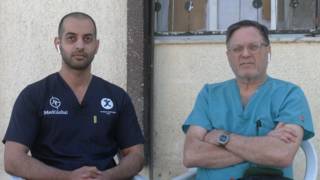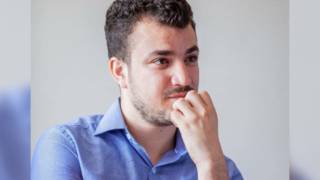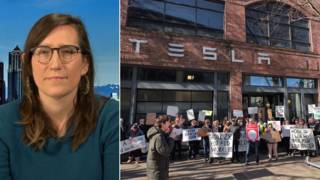
Guests
- Marc Van Der Houtattorney with the National Lawyers Guild. He has represented the L.A. Eight for the past 20 years.
- Michel ShehadehPalestinian activist and one of the L.A. Eight.
Prosecutors have ended a 20-year attempt to deport two Palestinian Americans for allegedly raising money for the Popular Front for the Liberation of Palestine. Earlier this year, an immigration judge ruled the government violated the defendants’ constitutional rights in a case he called “an embarrassment to the rule of law.” We speak to one of the men, Michel Shehadeh, and attorney Marc Van Der Hout. [includes rush transcript]
Transcript
AMY GOODMAN: The U.S. government has dropped a major deportation case dating back to the Reagan administration. On Tuesday, the Board of Immigration Appeals announced prosecutors will end a 20-year attempt to deport two Palestinian Americans for allegedly raising money for the Popular Front for the Liberation of Palestine.
In 1987, the Reagan administration attempted to bar the two men, Khader Hamide and Michel Shehadeh, and six others on the grounds that they were connected to a communist group. The men became known as the L.A. Eight. They were never deported, because a federal appeals court declared the anti-communist law unconstitutional.
Earlier this year, an immigration judge ruled the government violated the defendants’ constitutional rights in a case he called “an embarrassment to the rule of law.” The ruling marked the government’s sixth unsuccessful attempt at prosecution. Under a settlement, Hamide and Shehadeh will be allowed to apply for U.S. citizenship in three years.
Michel Shehadeh joins us the phone from California. One of his attorneys, Marc Van Der Hout of the National Lawyers Guild, is here in Washington, D.C. He has worked on the case for all the 20 years, along with attorneys from the ACLU and the Center for Constitutional Rights.
Michel Shehadeh, thank you for joining us. This case has taken you through four presidential administrations. Your feeling on the dropping of the case?
MICHEL SHEHADEH: Well, I’m really thrilled and relieved that, after 21 years, this day that we were dreaming of it, you know, it’s here now. We feel vindicated, and this dark cloud and the nightmare of this case that felt like a sword hanging over our head is finally finished.
AMY GOODMAN: Marc Van Der Hout, you’ve been there from the beginning. How was this case brought?
MARC VAN DER HOUT: The government, from day one, tried to use this case to establish its right to go after immigrants in this country who have done nothing illegal. William Webster, the head of the FBI, admitted when he was being confirmed for the CIA that the government had done a three-year undercover operation — surveillance of Michel, Khader and the others — and had come up with nothing they had done illegal, no crimes committed.
They turned it over to immigration and said, “Can you figure out some way to deport these people? Why? Because we don’t like their views. We don’t like what they’re doing, about their supporting the rights to a Palestinian homeland and their organizing efforts in the Los Angeles community.”
So the government went after them. As you mentioned, the first statute, the McCarran-Walter Act, was declared unconstitutional. Then Congress passed a law saying we can deport people for providing material support for terrorist organizations, and it said in furtherance of their terrorist activity. We thought, “Great! Case over.” They had never been accused of furthering terrorist activity. But the government used that to say, we’re going to try to deport people and establish the right to deport people if they raise money for humanitarian causes, distribute literature of an organization that also has a military component to it. And that’s what this case has been about since day one.
AMY GOODMAN: The Walter-McCarran sic against communists?
MARC VAN DER HOUT: McCarran-Walter Act, yeah, right.
AMY GOODMAN: McCarran-Walter Act against communists.
MARC VAN DER HOUT: Correct. That was the first statute. That was declared unconstitutional. We got that statute declared unconstitutional. Congress finally threw it out. That was a McCarthy-era relic.
AMY GOODMAN: And they were saying that the Popular Front for the Liberation of Palestine is communist?
MARC VAN DER HOUT: Was a communist organization, correct.
AMY GOODMAN: And how did it come to be that at this point, during the Reagan administration, during the so-called war on terror, a very serious crackdown today, that the case was actually dropped?
MARC VAN DER HOUT: The government lost the case probably six times totally in the course of the 20 years. Each time, they went to Congress to change the law and tried to get the decisions overruled from the courts. Finally, they had to prove their case last year in a related case, Aiad Barakat, one of the individuals who was applying for citizenship. They tried to deny him citizenship on the same grounds: providing material support to the PFLP. The government had nothing. They couldn’t prove their case. I think finally they realized, when they had to come up with evidence, they could come up with nothing. And saner minds prevailed finally after 20 — over 20 years, and they decided to drop the case.
AMY GOODMAN: Is the PFLP considered a terrorist organization by the Bush administration?
MARC VAN DER HOUT: PFLP has been designated, since 1997, as a terrorist organization. They —
AMY GOODMAN: Ten years after these guys had first been charged with it.
MARC VAN DER HOUT: Correct, absolutely. And that’s one of the issues that has always been in this case. It was not illegal to distribute newspapers. We think it’s still not illegal to distribute newspapers of organizations or to give money for charities, which is one of the main things the Bush administration has been doing now, prosecuting individuals for raising money for charities that have some remote connection, perhaps, to groups abroad that are engaged in military struggles, whether it was the PFLP in the ’80s or Hamas now or other organizations. The government has been using this case to try to establish the right to go after people for such activities.
AMY GOODMAN: Michel Shehadeh, tell us, when this first happened in 1987, what were you doing at the time? How did you learn you were under surveillance? And how has this affected you, your family, over the last 20 years?
MICHEL SHEHADEH: Well, Amy, this case happened in 1987, on January 26 of 1987, and I was living in Long Beach then. I was sleeping in my apartment with my three-year-old son when about 15 agents barged into my house and handcuffed me and dragged me outside in front of my son. And outside, the scene was like a scene from Hollywood. We had the local police, three carloads, aiming their guns at the house and a helicopter hovering on top of the house. And they took me to prison, where we were in custody — it was then I found out that the other seven were also arrested. And we were incarcerated in San Pedro State Prison, maximum security for 23 days.
It took us a while to find out — until our attorneys came and visited after one week, that we found out the charges and the nature of the charges. We didn’t know why we were incarcerated. We were wondering what, you know, the reason were. And after one week, we found out that there was a plan, a secret plan then, that was leaked to the newspapers then, was — the plan was entitled “Alien Terrorists and Undesirables: A Contingency Plan.” And in the plan there were an outline of a test case, and that test case to establish a legal precedent, so in case of a war, as the plan says, or an incident, then Arab Americans will be round up en masse and put in concentration camp, like what happened to the Japanese Americans in 1945 after Pearl Harbor. And this test case will be to establish that legal precedent, so the government will be able to do it. And they said that they learned that from the registrations of Iranians in 1979 during the Iranian Revolution, when they wanted to do a registration of the Iranians, and they couldn’t, because they didn’t have the law.
So our attorneys in court were able to prove and establish that the process of this case followed the outline of the test case that was outlined in their plan to the letter. And so, we believe that we were this test case over the years. And, you know, we had six sets of charges throughout, because, as Marc has outlined, we were charged under the McCarran-Walter Act, then under the 1990 Immigration Act, then under the 1996 Antiterrorism Act, then under the PATRIOT Act, and also under the Real ID Act. So, we were charged retroactively also for things allegedly that were done way before the law was established.
And the toll on our lives was really huge, because, can you imagine 21 years living with uncertainty, stigmatized? You can’t get a job, because every time you go apply for a job and you get to the last stages of the job, somebody googles your name, and then all this media and the details of the case comes up, and usually the employer will get, you know, scared, or they don’t want to deal with people who are stigmatized as being or offering aid to terrorism. The uncertainty of not being able to plan your life, to go into long-term plans, because you don’t know if you’re going to be deported any time. The emotional toll on your family, that the family might be broken up if I was deported. My wife and my two American-born kids are here. They’re all American citizens, and I’m the only one who doesn’t have this paper and this document, and I can be deported. So, can you — you can imagine this nightmare of 21 years. It was really hard. It was like torture.
AMY GOODMAN: Marc Van Der Hout, I wanted to ask you a question about the judge, Bruce Einhorn, the L.A. federal immigration judge, who said the government’s conduct in the case was “an embarrassment to the rule of law” that left “a festering wound on” Hamide and Shehadeh, who have been in legal and personal limbo for two [decades], as we just heard Michel describe. The government’s decision to throw in the towel came nine months after Einhorn lambasted federal officials for violating the men’s rights, accusing the government of gross failure to comply with instructions to turn over to the men potentially exculpatory and other relevant information. What was that information?
MARC VAN DER HOUT: Well, they never turned it over. But the government conducted surveillance for three years, wiretaps under the Foreign Intelligence Surveillance Act, video undercover surveillance. We wanted to get all those records to prove that everything they had done and the government evidence against them was completely legal, that they had — everything they had done was public. The events that they did were public events. They raised money at these annual celebrations of the anniversary of the Popular Front for the Liberation of Palestine. They were public. They advertised on TV, etc. We wanted to be able to show that everything the government had showed that they were legally — acting legally.
AMY GOODMAN: Michel, will you bring suit against the government?
MICHEL SHEHADEH: No, because the — you know, this is like — the government is immune when it comes to cases like that. And that’s not our interest. You know, we wanted this day to be vindicated and to prove that this case has always been a political case, that we have done nothing wrong, that all we did is to speak up our mind and our hearts and to relay our thoughts to the public in regards to the Palestinian struggle and to educate for Palestinian self-determination. That’s always been our interest, and that’s what remains the case.
And the idea that the truth came out is, to us, is a big payoff. We are finally free, and the government has admitted that for 21 years that we have done nothing wrong. And, actually, I just read the statement that said that the government says that after a thorough examination they found out that we are not a danger to this country. And I said, you know, if they listened to us from the beginning, you know, this would have saved 21 years of torture for us and a lot of expenses for the tax dollars that have been spent on fabricated, trumped-up charges. And this money should have been spent somewhere else.
AMY GOODMAN: Well, Michel Shehadeh, I want to thank you for being with us, one of the L.A. Eight. The government has finally dropped charges against him. And also Marc Van Der Hout, thank you very much for joining us, of the National Lawyers Guild —
MARC VAN DER HOUT: Thank you very much, Amy. I appreciate it.
AMY GOODMAN: — represented this case for the full 20 years.











Media Options